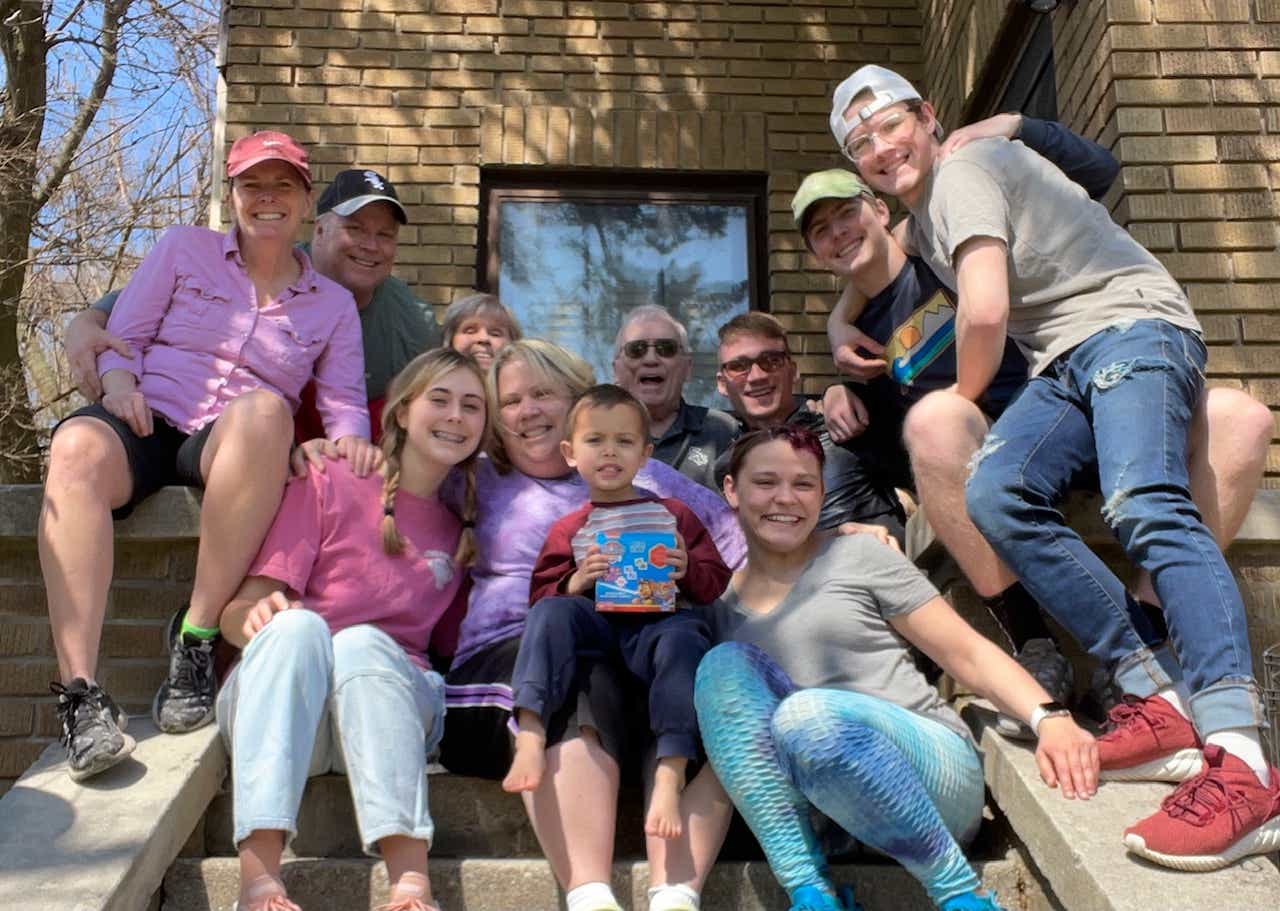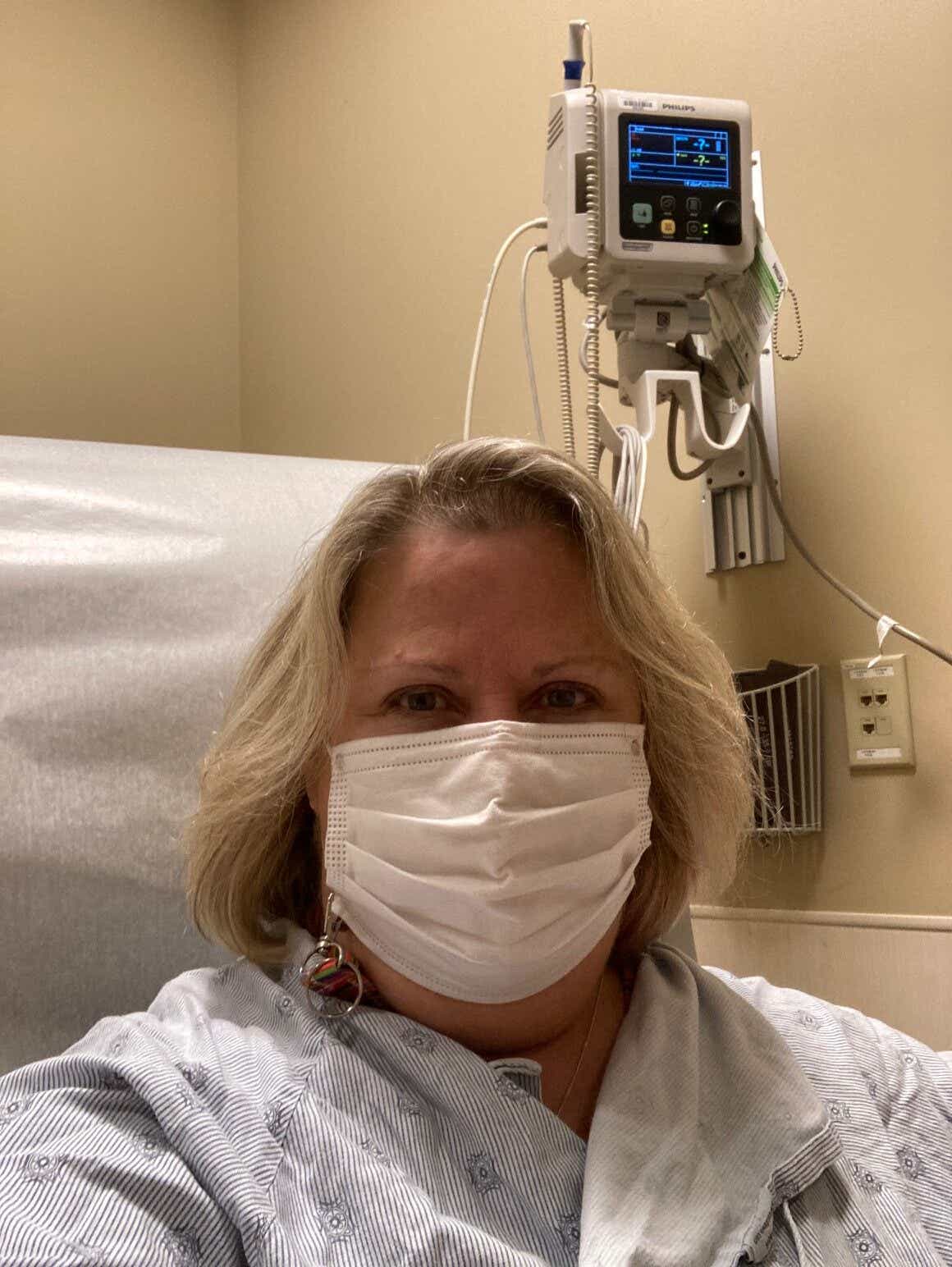Colleen Dunlavy had missed her last mammogram. As a fifth-grade teacher and single mother of five, she scheduled it during the December holiday, when she knew she’d have some time off. But as the date drew closer and covid cases started to rise again, she decided to push it. Finally, in February of 2021, she made her way into the doctor’s office.
After being called back for a second mammogram and then a biopsy, Dunlavy learned that she had breast cancer. She started radiation treatment that summer and loved her radiologist. When it came time to meet with an oncologist, Dunlavy didn’t hesitate to schedule an appointment with the practitioner her radiologist recommended.

But at her very first appointment, Dunlavy felt like something was off. Her brother had accompanied her to the appointment to help her process the onslaught of information, and the oncologist directed the entire conversation toward him. “He didn’t even ask who my brother was,” Dunlavy recalls. “Maybe he assumed he was my husband. But I knew [the oncologist] was the expert, so I just did my best to listen and take notes.” Dunlavy was 56 at the time, and since she had not yet gone through menopause and her cancer was hormone-receptor-positive, her oncologist prescribed Tamoxifen, an anti-estrogen therapy meant to prevent a recurrence of breast cancer. She would be on the drug for 10 years.
According to oncologist Linnea Chap, director of breast cancer and women’s oncology at UCLA David Geffen School of Medicine, a patient may be prescribed a long-term treatment like Tamoxifen because at least 25 percent of breast cancer recurrences occur after five years. There are tools to help physicians determine the likelihood of a recurrence, like Hologic’s Breast Cancer Index, which has a predictive component that determines whether continuing longer treatment could help reduce that risk of recurrence. Unfortunately, says Dr. Chap, side effects from treatment of hormone-sensitive breast cancer are quite common and can vary from mild to disabling. “In essence,” Dr. Chap explains, “all of these drugs are starving the cancer cells of estrogen…it’s like taking water away from a plant.”
Within a week of being on Tamoxifen, Dunlavy could hardly function. She was vomiting, felt dizzy all the time, and had extreme brain fog. “I couldn’t even drive,” Dunlavy recalls. She tried to get in touch with her oncologist but couldn’t get a response. “I knew it was during Covid and maybe I wasn’t a high-priority patient, but I felt like nobody was listening to me,” Dunlavy remembers.
Finally, Dunlavy went directly to the oncologist’s office. When he entered the examining room, Dunlavy expressed her concerns: “I told him that I couldn’t eat, that I felt feverish all the time, and that I couldn’t even remember my kids’ names. He suggested I try sudoku puzzles to keep my brain active. I’m a teacher — I tutor high school students in math. But he just kept telling me to do puzzles.”

When Dunlavy asked about her nausea, she said, her oncologist told her that she just needed to try harder to withstand it. Overwhelmed by the idea that she might have to deal with these side effects for a decade, Dunlavy began to cry. “I was just so frustrated,” said Dunlavy. “He told me I needed to ‘buck up.’”
Ultimately, Dunlavy’s oncologist agreed to temporarily suspend treatment and run some more tests. After three weeks off the drug, Dunlavy felt like herself again and returned for a follow-up appointment. She said the oncologist told her that based on her test results, he would be putting her back on the Tamoxifen. “I asked him if I could see my results. He told me that he had everything covered and that I needed to realize that cancer is serious. I knew it was serious — I was the one living with it.”
Dunlavy told her oncologist she didn’t think she could handle more treatment and began to cry. “Then he said, ‘If you can’t handle it, maybe you should take a leave of absence from your job.’ I couldn’t take a 10-year leave of absence. I would rather have had surgery again.” She says her oncologist told her she was being too emotional and insisted she try the medication again.
Dunlavy said she followed all of her oncologist’s advice on how to mitigate the side effects, but nothing helped. “I started to blame myself,” Dunlavy recalls. “Maybe I was too emotional. I felt so alone.” She researched alternate drug options but didn’t bring them up with her oncologist out of fear that he would dismiss her, and that she might cry in front of him again. “It wasn’t until I told my son that my oncologist had said he was disappointed in me for coming to see him again that I realized, Why am I doing this? There has to be a better way.” So Dunlavy set about finding a new oncologist.
When Dunlavy found someone she liked, she was upfront about her needs. “I told her, ‘I know you’re the doctor, but I need to feel like we’re a team.’”
The new oncologist wholeheartedly agreed with this approach, Dunlavy said. “It wasn’t until I started seeing my new oncologist that I realized my original one didn’t know a thing about me. He never took a single note or asked me about my life. Every time I saw him, I told him I was a teacher, and he never remembered. With my new oncologist, every time I come in, she asks ‘How are the kids? What’s going on? Tell me how you’re feeling.’ She’s a good communicator and a good listener. If I tell her I’m in pain, she treats me with empathy, and then we come up with a game plan.”
Dr. Chap also stresses how crucial it is for patients and physicians to have a good rapport: “It needs to be established from the get-go that the patient and physician are a team, and on this journey together. Cancer is a frightening and life-changing experience. Patients need to know they’re being listened to, and to have trust in their doctor.”

Dunlavy wants to share her story so that other patients know that it’s OK — and even encouraged — to advocate for themselves: “If a doctor isn’t a fit for you, and if you feel like they’re dismissive or biased, don’t ignore that feeling,” she says. “You have a right to know what’s going on in your own treatment, and for your concerns to be taken seriously.” For now, Dunlavy said, she’s off the Tamoxifen while her new oncologist assesses her hormone levels. If she’s confirmed to be postmenopausal, she’ll be able to go on a different drug that she may be able to tolerate better. What matters most to Dunlavy is that she finally feels like she’s an active participant in her own treatment. “I used to leave my oncologist’s office filled with dread,” Dunlavy says. “Now I leave feeling hopeful.” That’s the outcome Dr. Chap always strives for with her own patients. “We have made tremendous strides in treating cancer,” says Dr. Chap, “but compassion can be the best medicine of all.”









